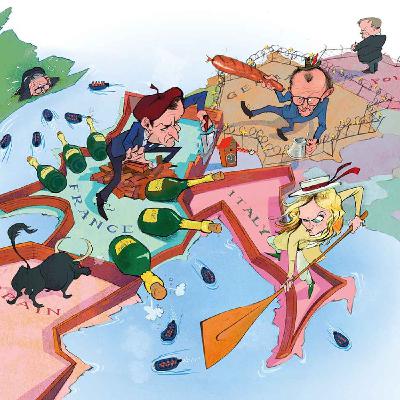Discover The Edition
The Edition

The Edition
Author: The Spectator
Subscribed: 1,808Played: 95,157Subscribe
Share
© 343517
Description
The Spectator's flagship podcast featuring discussions and debates on the best features from the week's edition. Presented by Lara Prendergast and William Moore.
Hosted on Acast. See acast.com/privacy for more information.
369 Episodes
Reverse
A year on from his presidential election victory, what lessons can Britain learn from Trump II? Tim Shipman writes this week’s cover piece from Washington D.C., considering where Keir Starmer can ‘go big’ like President Trump. Both leaders face crunch elections next year, but who has momentum behind them? There is also the question of who will replace Peter Mandelson as ambassador to the United States. Can Starmer find a candidate who can get the Americans on side?Host Lara Prendergast is joined by The Spectator’s political editor Tim Shipman, features editor Will Moore and commissioning editor Mary Wakefield.As well as the cover, they discuss Mary’s piece urging us not to ‘look away’ in the wake of the Huntingdon train stabbings; whether Zack Polanski can harness the energy seen in Zohran Mamdani’s New York City mayoral election victory; and the growing fashion for polyamory.Plus: what books have the panel enjoyed reading this year?Become a Spectator subscriber today to access this podcast without adverts. Go to spectator.co.uk/adfree to find out more.For more Spectator podcasts, go to spectator.co.uk/podcasts. Contact us: podcast@spectator.co.uk
Hosted on Acast. See acast.com/privacy for more information.
Big Tech is under the spell of the occult, according to Damian Thompson. Artificial intelligence is now so incredible that even educated westerners are falling back on the occult, and Silicon Valley billionaires are becoming obsessed with heaven and hell. An embrace of the occult is not just happening in California but across the world – with ‘WitchTok’, a new trend of middle-class women embracing witchcraft. Is this spooky or just sad? And to what extent are they just following in the tradition of the Victorian charlatan?Host Lara Prendergast is joined by the Spectator’s associate editor – and host of the Holy Smoke podcast – Damian Thompson, alongside writers and Spectator regulators Arabella Byrne and Mark Mason.As well as the cover, they discuss: the fascinating world of the London tube network – despite the misery of the northern line; the problems facing Kemi Badenoch, the allure of Reform UK and why Trump seems to recover from every scandal; whether languages should be saved; and they celebrate cartoonist Michael Heath, who is turning 90 – meaning he has drawn for the Spectator for 75 years.Plus: what does Mark think Cliff Richard and Jeffrey Archer have in common with Donald Trump?Produced by Patrick Gibbons.The Spectator is trialling new formats for this podcast, and we would very much welcome feedback via this email address: podcast@spectator.co.ukBecome a Spectator subscriber today to access this podcast without adverts. Go to spectator.co.uk/adfree to find out more.For more Spectator podcasts, go to spectator.co.uk/podcasts. Contact us: podcast@spectator.co.uk
Hosted on Acast. See acast.com/privacy for more information.
‘The Ultras’ are the subject of The Spectator’s cover story this week – this is the new Islamo-socialist alliance that has appeared on the left of British politics. Several independent MPs, elected amidst outrage over the war in Gaza, have gone on to back the new party created by former Labour MPs Jeremy Corbyn and Zarah Sultana. The grouping has got off to a rocky start but – as Angus Colwell and Max Jeffery write – there are expectations that they could pick up dozens of seats across the country. Can the hard-left coalition hold?Host Lara Prendergast is joined by the Spectator’s deputy political editor James Heale, commissioning editor Lara Brown and Angus Colwell – who also writes the Spectator’s new morning newsletter Spectator Daily.As well as the cover, they discuss: the intellectual forces behind Reform UK; whether Piers Morgan is right that ‘woke is dead’; why the American ‘Wasp’ aesthetic was once so appealing; and are sex robots a fun consequence of capitalism – or a symptom of a lonely society.Produced by Patrick Gibbons.The Spectator is trialling new formats for this podcast, and we would very much welcome feedback via this email address: podcast@spectator.co.ukBecome a Spectator subscriber today to access this podcast without adverts. Go to spectator.co.uk/adfree to find out more.For more Spectator podcasts, go to spectator.co.uk/podcasts. Contact us: podcast@spectator.co.uk
Hosted on Acast. See acast.com/privacy for more information.
‘Here be dragons’ declares the Spectator’s cover story this week, as it looks at the continuing fallout over the collapse of the trial of two political aides accused of spying for China in Westminster. Tim Shipman reveals that – under the last Conservative government – a data hub was sold to the Chinese that included highly classified information; one source describes this to him as a ‘stratospheric clusterfuck’. Why do successive governments seem to struggle with UK-China relations? And, with many unanswered questions still remaining, what’s the truth over this case? Host Lara Prendergast is joined by the Spectator’s political editor Tim Shipman, arts editor Igor Toronyi-Lalic and deputy editor Freddy Gray. As well as the cover, they discuss: how J.D. Vance appears unstoppable in the (silent) race to be the next Republican nominee for president; whether French, or British, parenting is better; and why the art of costume design, like so many crafts, is in decline. Plus: is Sheridan Westlake, the most important Tory you’ve never heard of, really the ‘cockroach of Westminster’? Produced by Patrick Gibbons. The Spectator is trialling new formats for this podcast, and we would very much welcome feedback via this email address: podcast@spectator.co.ukBecome a Spectator subscriber today to access this podcast without adverts. Go to spectator.co.uk/adfree to find out more.For more Spectator podcasts, go to spectator.co.uk/podcasts. Contact us: podcast@spectator.co.uk
Hosted on Acast. See acast.com/privacy for more information.
The Spectator’s cover story this week looks at ‘the fear’ gripping Jewish people amidst rising antisemitism. Reflecting on last week’s attack in Manchester, Douglas Murray says that ‘no-one in the Jewish community was surprised’ – a damning inditement on Britain today. How do we tackle religious intolerance? And is there room for nuance in the debate about Israel and Palestine? Host Lara Prendergast is joined by the Spectator’s US editor Freddy Gray, associate editor – and host of our religious affairs podcast Holy Smoke – Damian Thompson and commissioning editor Mary Wakefield. As well as the cover, they discuss: how biological innovations are threatening motherhood; the views of the new – and first female – Archbishop of Canterbury Sarah Mullally; and how New York has ended up with (almost certainly) an incoming socialist mayor in Zohran Mamdani.Plus: the panel mourn the novelist Jilly Cooper, and Damian reveals how he ended up with a driving conviction – despite having never passed his driving test.Produced by Patrick Gibbons and Oscar Edmondson.The Spectator is trialling new formats for this podcast, and we would very much welcome feedback via this email address: podcast@spectator.co.ukBecome a Spectator subscriber today to access this podcast without adverts. Go to spectator.co.uk/adfree to find out more.For more Spectator podcasts, go to spectator.co.uk/podcasts. Contact us: podcast@spectator.co.uk
Hosted on Acast. See acast.com/privacy for more information.
The Spectator’s cover story this week is an interview with Conservative leader Kemi Badenoch ahead of the Tory party conference. Reflecting on the criticism she received for being seen as slow on policy announcements, she says that the position the Conservatives were in was ‘more perilous than people realise’ and compares herself to the CEO of an ailing firm. Can Kemi turn it around for the Tories?Host William Moore is joined by the Spectator’s political editor Tim Shipman – who interviewed Kemi – alongside commissioning editor Lara Brown, and academic and author Philip Hensher. They discuss whether the ‘cult of Thatcher’ needs to die, Tim says he's more Disraeli and Bismarck to Lara's Pitt and Philip reveals what once got him sacked from the House of Commons.Plus: while discussing Philip's review of Graham Robb's The Discovery of Britain, the panel ponder which politicians are best at invoking history.Produced by Patrick Gibbons.The Spectator is trialling new formats for this podcast and we would very much welcome feedback via this email address: podcast@spectator.co.ukBecome a Spectator subscriber today to access this podcast without adverts. Go to spectator.co.uk/adfree to find out more.For more Spectator podcasts, go to spectator.co.uk/podcasts. Contact us: podcast@spectator.co.uk
Hosted on Acast. See acast.com/privacy for more information.
First: who has the Home Secretary got in her sights?Political editor Tim Shipman profiles Shabana Mahmood in the Spectator’s cover article this week. Given Keir Starmer’s dismal approval ratings, politicos are consumed by gossip about who could be his heir-apparent – even more so, following Angela Rayner’s defenestration a few weeks ago. Mahmood may not be the most high-profile of the Starmer movement, but she is now talked about alongside Wes Streeting and Andy Burnham as a potential successor to Starmer.But – it all depends on what she can achieve at the Home Office. So, who does she have in her sights? Tim joined the podcastNext: why the philosopher king of Silicon Valley is reinventing the ‘Antichrist’ theory What do Mohammed, Martin Luther, King George III, Adolf Hitler, Henry Kissinger and Bill Gates have in common? They have all been identified as the Antichrist. And now the theory is back, preoccupying the mind of billionaire Peter Thiel, who believes that ‘a globe-trotting liberal elite… are using their billions to manufacture a new world order’. So why is Thiel, the co-founder of Paypal and Palantir, so obsessed with the Antichrist? Damian Thompson joins the podcast to discuss.And finally: the cost-of-giving crisisRupert Hawksley, the Spectator’s new opinion editor, examines the crisis facing charity shops. Over 50 stores have shut this year with the big four – the British Heart Foundation, Barnado’s, Oxfam and Cancer Research UK – struggling to maintain healthy sales. This isn’t just a crisis for the charities, he argues, but also for the consumers who rely on the shops.Rupert joined the podcast alongside another charity shop enthusiast, the Spectator’s editor Michael Gove. What’s the most prized charity shop find?Plus: Henry Jeffreys discusses the horror of wine lists and Angus Colwell reviews a new BBC Sounds podcast on David Bowie, ahead of the ten year anniversary of his death next year.Hosted by William Moore and Lara Prendergast.Produced by Patrick Gibbons.Become a Spectator subscriber today to access this podcast without adverts. Go to spectator.co.uk/adfree to find out more.For more Spectator podcasts, go to spectator.co.uk/podcasts. Contact us: podcast@spectator.co.uk
Hosted on Acast. See acast.com/privacy for more information.
First: a warning from history Politics moving increasingly from the corridors of power into the streets, economic insecurity exacerbating tensions and the centre of politics failing to hold; these are just some of the echoes from Weimar Germany that the Spectator’s editor Michael Gove sees when looking at present-day Britain. But, he says, ‘there are grounds for hope’ – what are they? Michael joined the podcast to discuss. Next: why did science succumb to the ‘culture wars’? Biologist and peer Matt Ridley bemoans the ‘cultification of science’, arguing that ‘left-wing ideological nonsense’ ended up permeating through all scientific disciplines. Thinking ‘neutral facts’ were safe, Matt admits he – and colleagues – may have been naïve as one by one different battlefields emerged. Matt joined the podcast to discuss. Has science thrown off the shackles of the ‘culture wars’?And finally: how many books have you read?Emily Hill delves into the world of competitive reading this week – the rise of people publicising the books they’ve read, particularly through social media. Emily calls this ‘conspicuous’ and notes it appears to be a trend amongst mainly female influencers. But is this solely performative or – in a world of diminishing attention spans – could the trend be promoting the act of reading? Emily joined the podcast alongside BookTok blogger Lucas Oakeley.Plus: Mark Mason provides his notes on guided walks. Mark will also be hosting a guided walk for the Spectator, for tickets go to www.spectator.co.uk/eventsHosted by William Moore and Lara Prendergast.Produced by Patrick Gibbons.Become a Spectator subscriber today to access this podcast without adverts. Go to spectator.co.uk/adfree to find out more.For more Spectator podcasts, go to spectator.co.uk/podcasts. Contact us: podcast@spectator.co.uk
Hosted on Acast. See acast.com/privacy for more information.
Michael Gove and Madeline Grant return with another episode of Quite right!, The Spectator’s new podcast promising sanity and common sense in an increasingly unhinged world. This week, they talk about Labour’s deputy drama, discuss whether Britain is sliding into a revolutionary mood a la France and investigate the claim in a new book that Margaret Thatcher was autistic.To hear the full episode, search Quite right! wherever you get your podcasts, or go to www.spectator.co.uk/quiterightQuite right! is also on our YouTube channel SpectatorTV.Become a Spectator subscriber today to access this podcast without adverts. Go to spectator.co.uk/adfree to find out more.For more Spectator podcasts, go to spectator.co.uk/podcasts. Contact us: podcast@spectator.co.uk
Hosted on Acast. See acast.com/privacy for more information.
First: a look ahead to President Trump’s state visit next weekTransatlantic tensions are growing as the row over Peter Mandelson’s role provides an ominous overture to Donald Trump’s state visit next week. Political editor Tim Shipman has the inside scoop on how No. 10 is preparing. Keir Starmer’s aides are braced for turbulence. ‘The one thing about Trump which is entirely predictable is his unpredictability,’ one ventures. And government figures fear he may go off message on broadcast – he is scheduled to be interviewed by GB News.It is rare for leaders to receive a second visit, especially those in their second term. But, as Tim says, ‘Britishness is fashionable in Washington’ and no-one likes ‘royal treatment’ more than Trump. So, can Starmer take advantage of the President’s ‘love of the deal’? Tim joins the podcast to discuss.Next: why are historical figures being labelled neurodiverse?A new biography of Margaret Thatcher has provoked much discussion by claiming that Britain’s former Prime Minister was autistic. The proof for such a claim rests on the Iron Lady’s (supposed) lack of a sense of humour, a lack of feeling embarrassed and a tendency to see the world in black and white. But is there a danger in reappraising historical and political figures, particularly when it comes to personal traits? Historians – and frequent Spectator contributors – Robert Tombs and John Keiger joined the podcast to give their verdict.And finally: is everyone on Ozempic?One of the Spectator’s writers, under the pseudonym Henrietta Harding, headed out on what she terms ‘Ozempic safari’ – spotting the ‘Mounjaro Mummies’ as they drop off their children at school. ‘We know what to look for’, she says, ‘sunken faces, slightly wasted arms and, of course, envy-inducing weight loss’.But the school gates aren’t the only place Ozempic seems to have taken hold. Westminster is awash with politicians who have suspiciously slimmer fitting suits – but why? Associate editor Toby Young and deputy political editor James Heale join the podcast to make sense of the trend for trim.Plus: As President Xi re-emerges, Francis Pike asks who’s really in charge in China?Hosted by William Moore and Lara Prendergast.Produced by Patrick Gibbons and Oscar Edmondson.Become a Spectator subscriber today to access this podcast without adverts. Go to spectator.co.uk/adfree to find out more.For more Spectator podcasts, go to spectator.co.uk/podcasts. Contact us: podcast@spectator.co.uk
Hosted on Acast. See acast.com/privacy for more information.
Michael Gove and Madeline Grant launch ‘Quite right!’, the new podcast from The Spectator that promises sanity and common sense in a world that too often lacks both.Coffee House Shots listeners can enjoy an exclusive taste of their debut episode in which they take stock of a political summer dominated by Nigel Farage, a Labour government already facing mutiny, and the curious spectacle of Tory MPs moonlighting as gonzo reporters. From J.D. Vance’s Cotswold sojourn and Tom Skinner’s bish bash bosh patriotism, to Sydney Sweeney’s jeans advert causing a culture war, Michael and Madeleine discuss what really drives our politics: policies, or memes and vibes?To hear the full episode, search Quite right! wherever you get your podcasts, or find the full episode – in vision – on our YouTube channel SpectatorTV.Become a Spectator subscriber today to access this podcast without adverts. Go to spectator.co.uk/adfree to find out more.For more Spectator podcasts, go to spectator.co.uk/podcasts. Contact us: podcast@spectator.co.uk
Hosted on Acast. See acast.com/privacy for more information.
First: Reform is naff – and that’s why people like itGareth Roberts warns this week that ‘the Overton window is shifting’ but in a very unexpected way. Nigel Farage is ahead in the polls – not only because his party is ‘bracingly right-wing’, but ‘because Reform is camp’. Farage offers what Britain wants: ‘a cheeky, up-yours, never-mind-the-knockers revolt against our agonisingly earnest political masters’.‘From Farage on down,’ Roberts argues, ‘there is a glorious kind of naffness’ to Reform: daytime-TV aesthetics, ‘bargain-basement’ celebrities and big-breasted local councillors. ‘The progressive activists thought they could win the culture war simply by saying they had won it’, but ‘the John Bulls and Greasy Joans are stirring again’. Roberts loves how ‘the current excitement over flag-raising’ is the ‘conniptions’ it gives to ‘the FBPE crowd’. Of course, for Farage, planning for government ‘really cannot be a pantomime affair’. But ‘in these grim times’ we ‘need the romping Reform’. Gareth joins the podcast to make his case for Carry On Reform.Next: the ‘she’ consumed by masculine rageLionel Shriver reacts to the latest school shooting in America. The perpetrator was widely reported in the media with the pronouns ‘she/her’ which, Lionel argues, is not just an issue around politeness. This glosses over the fact that the shooter was biologically male, adding to the majority of cases of school shootings that are conducting by men. By pandering to this incoherence of the reality of the situation, it doesn’t help society to uncover the reasons behind the issue.Lionel joined the podcast alongside the Spectator’s US editor Freddy Gray. Freddy points out how this shooting is just one example of how younger people can be transfixed by the very darkest sides of the internet.And finally: why people make up languages Constructed language expert Dr Bettina Beinhoff and author and historian Peter Parker join the podcast to talk about ‘made-up’ languages. Why do humans construct languages outside of their every-day speech? Most people will have heard of Klingon or Elvish, used in books and film, but what about Polari – the subversive language used by groups of LGBT people decades ago – or the Potato language – which writer Melanie Ferbreach says her parents used to hide their conversations from her. Listeners may be impressed to hear Lara's own attempt at 'eggy-peggy'...Plus: with a special introduction from our political editor, Tim Shipman interviews shadow justice secretary Robert Jenrick – is he trying to outflank Farage? Hosted by William Moore and Lara Prendergast.Produced by Patrick Gibbons and Natasha Feroze.Become a Spectator subscriber today to access this podcast without adverts. Go to spectator.co.uk/adfree to find out more.For more Spectator podcasts, go to spectator.co.uk/podcasts. Contact us: podcast@spectator.co.uk
Hosted on Acast. See acast.com/privacy for more information.
First: an economic reckoning is looming ‘Britain’s numbers… don’t add up’, says economics editor Michael Simmons. We are ‘an ageing population with too few taxpayers’. ‘If the picture looks bad now,’ he warns, ‘the next few years will be disastrous.’ Governments have consistently spent more than they raised; Britain’s debt costs ‘are the worst in the developed world’, with markets fearful about Rachel Reeves’s Budget plans. A market meltdown, a delayed crash, or prolonged stagnation looms. The third scenario, he warns, would be the bleakest, keeping politicians from confronting Britain’s spendthrift state. We need ‘austerity shock therapy’ – but voters don’t want it. To discuss further, we include an excerpt from a discussion Michael had with our deputy editor Freddy Gray and economist Paul Johnson for Spectator TV. Next: can the foster system survive? ‘The foster system in this country is collapsing,’ Mary Wakefield warns. There around 80,000 children who need homes, but ‘a catastrophic lack of people prepared to care for them’. Every year the small pool of available foster households shrinks, with younger generations unwilling to become carers and more and more existing carers considering leaving. Mary joined the podcast to explain how bad the problem is, alongside author and full-time foster carer Rosie Lewis.And finally: the unsettling rise of DeathTokDamian Thompson highlights the rise of ‘DeathTok’ – the name given to videos shared on the social media platform Tik Tok by users who are dealing with life-threatening illnesses. Ordinary young people ‘employ adult communications skills to express adolescent feelings’ and share every stage of the ruthlessness of their cancer journey. The videos may upset younger uses who stumble across them, but for many this digital sense of community will prove invaluable.There is a wider question though – ‘the luxury of fading memories’ says Damian, is something we lose with every advance in media technology. Can this really be a good thing?Plus: Tom Slater says that Britain is having its own gilet jaunes moment and Philip Womack reacts to the news that the Pope will be getting some flatmates.Hosted by William Moore and Lara Prendergast.Produced by Patrick Gibbons and Oscar Edmondson.Become a Spectator subscriber today to access this podcast without adverts. Go to spectator.co.uk/adfree to find out more.For more Spectator podcasts, go to spectator.co.uk/podcasts. Contact us: podcast@spectator.co.uk
Hosted on Acast. See acast.com/privacy for more information.
First: Putin has set a trap for Europe and Ukraine ‘Though you wouldn’t know from the smiles in the White House this week… a trap has been set by Vladimir Putin to split the United States from its European allies,’ warns Owen Matthews. The Russian President wants to make a deal with Donald Trump, but he ‘wants to make it on his own terms’. ‘Putin would like nothing more than for Europe to encourage Ukraine to fight on… and lose even more of their land’. But, as Owen writes, those who count themselves among the country’s friends must ask ‘whether it’s time to choose an unjust peace over a just but never-ending war’. Have European leaders walked into Putin’s trap? Owen joins the podcast alongside Gideon Rachman of the Financial Times. Next: Lionel Shriver, Toby Young & Igor Toronyi-Lalic on the decline of shame in society A rise in brazen shoplifting, attempts to police public spaces and moralising over ‘Art’ – these are all topics touched on by columnists Lionel Shriver and Toby Young and Arts editor Igor Toronyi-Lalic in the magazine this week. Are these individual problems in their own right, or could they be symptomatic of wider failings in British society? Lionel, Toby and Igor joined the podcast to try to make sense of why guilt and shame seem to have disappeared in modern Britain.And finally: the hell of owning a holiday rentalWilliam Cash writes in the magazine this week about the trials and tribulations of running a holiday let. He complains that the lines between hotels and holiday lets have become blurred, and people of all ages are now becoming guests from hell. He writes: ‘it has become increasingly evident that middle class families have no idea how to behave on holiday… basic guest decorum seems to belong to a different summer holiday age’. So how did things get so bad? William joined the podcast alongside Spectator columnist Melissa Kite – who runs her own B&B in Ireland.Plus: ahead of the long weekend, Mark Mason reveals who we can thank for bank holidays. Hosted by William Moore and Lara Prendergast.Produced by Patrick Gibbons.Become a Spectator subscriber today to access this podcast without adverts. Go to spectator.co.uk/adfree to find out more.For more Spectator podcasts, go to spectator.co.uk/podcasts. Contact us: podcast@spectator.co.uk
Hosted on Acast. See acast.com/privacy for more information.
First: how Merkel killed the European dream ‘Ten years ago,’ Lisa Haseldine says, ‘Angela Merkel told the German press what she was going to do about the swell of Syrian refugees heading to Europe’: ‘Wir schaffen das’ – we can handle it. With these words, ‘she ushered in a new era of uncontrolled mass migration’. ‘In retrospect,’ explains one senior British diplomat, ‘it was pretty much the most disastrous government policy of this century anywhere in Europe.’ The surge of immigrants helped swing Brexit, ‘emboldened’ people-traffickers and ‘destabilised politics’ across Europe. Ten years on, a third of the EU’s member states within the Schengen area have now imposed border controls. Can freedom of movement survive in its current form? Lisa joined the podcast alongside Oliver Moody, Berlin correspondent for The Times. Next: the cultural impact of the railways It’s been 200 years since the world’s first public train travelled from Shildon to Stockton – across County Durham. Richard Bratby argues that this marked the start of a new era for Britain and the world: ‘no invention between the printing press and the internet has had as profound a cultural impact as the railways’. How can we explain the romantic appeal of the railways? Richard joined the podcast to discuss, alongside Christian Wolmar, author of over twenty books about the railways including The Liberation Line.And finally: who is the Greatest Of All Time?What do Lionel Messi, Roger Federer and Tom Brady have in common? Their acolytes would argue that they are the GOAT of their sport – the Greatest Of All Time. Why are fans so obsessed with the GOAT label? Are pundits guilty of recency bias? And does it really matter anyway? Journalist Patrick Kidd joined the podcast to discuss, alongside the Spectator’s Sam McPhail.Plus: Madeline Grant asks why not show J.D. Vance the real Britain? Hosted by William Moore and Gus Carter.Produced by Patrick Gibbons.Become a Spectator subscriber today to access this podcast without adverts. Go to spectator.co.uk/adfree to find out more.For more Spectator podcasts, go to spectator.co.uk/podcasts. Contact us: podcast@spectator.co.uk
Hosted on Acast. See acast.com/privacy for more information.
First: Nigel Farage is winning over womenDoes – or did – Nigel Farage have a woman problem? ‘Around me there’s always been a perception of a laddish culture,’ he tells political editor Tim Shipman. In last year’s election, 58 per cent of Reform voters were men. But, Shipman argues, ‘that has begun to change’. According to More in Common, Reform has gained 14% among women, while Labour has lost 12%. ‘Women are ‘more likely than men… to worry that the country is broken.’Many of Reform’s most recent victories have been by women: Andrea Jenkyns in the mayoral elections, Sarah Pochin to Parliament; plus, there most recent high profile defections include a former Tory Welsh Assembly member and a former Labour London councillor. What makes Reform’s success with women all the more remarkable is that it appears organic; ‘we haven’t forced this’ says Farage.So why are women turning to Reform UK? Tim Shipman and Sarah Pochin MP join the podcast to discuss. Next: is Italy experiencing a renaissance? From Italy, Owen Matthews argues that Prime Minister Giorgia Meloni has revived her nation. While he says that Italy has been ‘suffering from the same economic malaise’ as the rest of Europe, the macroeconomics covers up the true affordability of the country. Espressos cost €1.20, pizzas are no more than €10, and rents in even the swankiest areas are ‘laughably’ cheap compared to Britain. Plus, Owen sees none of the ‘media catastrophisation’ over issues like immigration, social cohesion and militant Islam that appears to grip the UK. So how has Meloni done it? To discuss, Owen joined the podcast alongside Antonello Guerrera, UK & Westminster correspondent for the Italian newspaper Repubblica.And finally: one in three British adults cannot swimThis week, Iram Ramzan provides her ‘notes on’ learning to swim saying, ‘it’s humiliating to admit that at 37’ she can’t. She’s not alone though – one third of British adults cannot swim, and the proportion appears to be rising. Iram highlights the disparities between different communities; 76 percent of South Asian women for example cannot swim 25 metres. Iram joined the podcast to discuss further, alongside fitness professional and entrepreneur Elle Linton who also learnt to swim in her thirties.Plus: what small error led Rachel Johnson to get a telling off from Noel Gallagher? And Max Jeffery reports from court, where the Spectator and Douglas Murray have won a defamation claim brought against them by Mohammed Hijab. Hosted by William Moore and Lara Prendergast.Produced by Patrick Gibbons.Become a Spectator subscriber today to access this podcast without adverts. Go to spectator.co.uk/adfree to find out more.For more Spectator podcasts, go to spectator.co.uk/podcasts. Contact us: podcast@spectator.co.uk
Hosted on Acast. See acast.com/privacy for more information.
First: the new era of censorship A year ago, John Power notes, the UK was consumed by race riots precipitated by online rumours about the perpetrator of the Southport atrocity. This summer, there have been protests, but ‘something is different’. With the introduction of the Online Safety Act, ‘the government is exerting far greater control over what can and can’t be viewed online’. While the act ‘promises to protect minors from harmful material’, he argues that it is ‘the most sweeping attempt by any liberal democracy to bring the online world under the control of the state’. Implemented and defended by the current Labour government, it is actually the result of legislation passed by the Conservatives in 2023 – which Labour did not support at the time, arguing it didn’t go far enough. So how much of a danger is the Act to free speech in Britain? John joined the podcast to discuss further alongside former Conservative minister Steve Baker, MP from 2010-24, and who was one of the biggest critics of the bill within the Conservative Party at the time. Next: should we be worried about protests against migrants? This week, outside a hotel in Epping, groups amassed to protest against the migrants housed there, with counter-protestors appearing in turn. Tommy Robinson might not have appeared in the end, but the Spectator’s Max Jeffrey did, concluding that the protests were ultimately ‘anticlimactic’. Nevertheless, the protests have sparked debate about the motivations of those speaking out against the migrants – are there legitimate concerns voiced by locals, or are the protests being manipulated by figures on the political fringes? And what do the protests tell us about community tensions in the UK? Max joined the podcast to discuss alongside the editor of Spiked Tom Slater. And finally: why are ‘romantasy’ novels so popular?Lara Brown writes in the magazine this week about the phenomenon of the genre ‘romantasy’, which mixes romance with fantasy. While ‘chick-lit’ is nothing new, Lara argues that this is ‘literature taken to its lowest form’, emblematic of the terminally online young people who consume it. Nevertheless, it is incredibly popular and is credited by publishers as boosting the British fiction industry to over £1 billion. To unpack the genre's popularity, Lara joined the podcast, alongside Sarah Maxwell, the founder of London’s first romance-only bookshop Saucy Books, based in Notting Hill. Hosted by William Moore and Lara Prendergast. Produced by Patrick Gibbons and Megan McElroy.Become a Spectator subscriber today to access this podcast without adverts. Go to spectator.co.uk/adfree to find out more.For more Spectator podcasts, go to spectator.co.uk/podcasts. Contact us: podcast@spectator.co.uk
Hosted on Acast. See acast.com/privacy for more information.
The soul suckers of private equity, Douglas Murray on Epstein and MAGA & are literary sequels ‘lazy’?First up: how private equity is ruining BritainGus Carter writes in the magazine this week about how foreign private equity (PE) is hollowing out Britain – PE now owns everything from a Pret a Manger to a Dorset village, and even the number of children’s homes owned by PE has doubled in the last five years. This ‘gives capitalism a bad name’, he writes. Perhaps the most symbolic example is in the water industry, with water firms now squeezed for money and saddled with debt. British water firms now have a debt-to-equity ratio of 70%, compared to just 4% in 1991. Britain’s desperation for foreign money has, quite literally, left Britain ‘in the shit’. Gus joined the podcast to discuss further, alongside the journalist Megan Greenwell, author of Bad Company: Private Equity and the Death of the American Dream. (00:46)Next: why is MAGA so incensed over Jeffrey Epstein?Six years after he died, the Jeffrey Epstein scandal is still haunting Donald Trump. Trump had vowed to release all files on various cases that attract conspiracy theorists – from JFK to Martin Luther King Jr. What makes the Epstein case different, as Douglas Murray writes in the magazine this week, is that the case was so recent and Epstein’s ties with the elites, many of whom are still in power. Trump appeared to backtrack on releasing files relating to Epstein, prompting ire from the MAGA world, and there is now mounting cross-party pressure to uncover who knew what. Mike Johnson, the House speaker, sent representatives home early for summer, and there is even talk of Ghislaine Maxwell testifying. Why is the Epstein scandal such a lightning rod for MAGA rage? Douglas Murray joined the Spectator to discuss. The full interview can be found on Spectator TV. (15:49)And finally: are literary sequels ‘lazy’?It’s ‘sod’s law’, says the Spectator’s literary editor Sam Leith, that when a friend’s book is due to be reviewed in the pages of the books section that you edit, the review will be bad. Mike Cormack reviews Men In Love by Irvine Welsh this week, calling the decision by Welsh to pen another sequel to Trainspotting ‘lazy’. At the Spectator this made us ponder whether this is true of all literary sequels, and what motivates authors to stick with characters and stories that they know.Sam joined us to discuss further alongside Lucy Thynne, the Telegraph’s deputy literary editor. (33:59)Hosted by William Moore and Lara Prendergast.Produced by Patrick Gibbons and Megan McElroy.Become a Spectator subscriber today to access this podcast without adverts. Go to spectator.co.uk/adfree to find out more.For more Spectator podcasts, go to spectator.co.uk/podcasts. Contact us: podcast@spectator.co.uk
Hosted on Acast. See acast.com/privacy for more information.
First up: how the Bank of England wrecked the economyBritain’s economy is teetering on the brink of a deep fiscal hole, created by billions of pounds of unfunded spending – never-ending health promises, a spiralling welfare bill and a triple lock on the state pension, which will cost three times as much as originally estimated.Although politicians ‘deserve much of the blame for the economic state we’re in’, it’s Andrew Bailey – Michael Simmons argues in the magazine this week – who ‘has enabled their recklessness’.He joined the podcast to discuss who really broke Britain with Kate Andrews, Deputy Editor of The Spectator’s world edition and former Economics Editor. (01:15)Next: has Ukraine lost faith in Zelensky?Whilst Donald Trump’s surprise ‘newfound support for Ukraine is a welcome lifeline’, Owen Matthews writes in the magazine this week, ‘the question is whether his help will be enough to stop Russia’s relentless attacks before Ukraine is engulfed in a critical military, political and social crisis that threatens to destroy it from within’. Ukraine is running out of men, and is racked by corruption scandals and purges. As a consequence, public faith in Volodymyr Zelensky is declining.To discuss what’s next for Ukraine, Owen joined the podcast. (24:29)And finally: the joys of mudlarkingIn the arts section of the magazine this week, Margaret Mitchell reviews a new exhibition at the Museum of London Docklands on mudlarking – the practice of combing at low tide for washed-up items of historical interest. These can include everything from statues of Roman gods and goddesses to the common vape – and it’s a hobby that is booming in popularity.To discuss, Margaret joined the podcast alongside Lara Maiklem, mudlarker and Fellow of the Society of Antiquaries. (41:07)Hosted by William Moore and Gus Carter. Produced by Oscar Edmondson. Become a Spectator subscriber today to access this podcast without adverts. Go to spectator.co.uk/adfree to find out more.For more Spectator podcasts, go to spectator.co.uk/podcasts. Contact us: podcast@spectator.co.uk
Hosted on Acast. See acast.com/privacy for more information.
This week: Peerless – the purge of the hereditary peersFor this week’s cover, Charles Moore declares that the hereditary principle in Parliament is dead. Even though he lacks ‘a New Model Army’ to enforce the chamber’s full abolition, Keir Starmer is removing the hereditary peers. In doing so, he creates more room, reduces the Conservatives’ numerical advantage, and improves ‘the sex and ethnic balance’. But 86 hard-working and dutiful peers ‘lacking worldly ambition or partisan passions’ will be lost.Also in the magazine, Sophia Falkner, researcher at The Spectator, sets out exactly what we stand to lose by profiling some of the most capable hereditary peers in the House. She warns that Labour’s purge is ripping the heart out of the Lords. Sophia and Charles spoke to Natasha Feroze earlier this week on Spectator TV – you can also hear their discussion on the podcast. (01:10)Next: Why should the hunt for the next Archbishop of Canterbury be ‘inclusive’?That’s the question Revd Fergus Butler-Gallie asks in the magazine this week. ‘It will be a miracle,’ writes Butler-Gallie, ‘if we know the name of the new Primate of All England by the autumn.’ Justin Welby announced his resignation as Archbishop of Canterbury last November; it took until May this year even to assemble the committee to discuss his potential successors.For Butler-Gallie, the process doesn’t have to be swift – it only has to be ‘holy’. To discuss what exactly constitutes a ‘holy process’ – and what this drawn-out process says about the Church – he joined us alongside Esme Partridge, journalist and master’s student in philosophy and religion at Cambridge University. (18:57)Finally: Does AI belong on the tennis court?Patrick Kidd writes in the magazine about the creep of AI spoiling sport, following a high-profile incident during this week’s Wimbledon tournament in which the AI system stands accused of ‘human error’. To discuss, Kidd was joined by Dr Tom Webb, founder of the Referee and Sports Official Research Network. (34:16)Hosted by William Moore and Gus CarterProduced by Oscar Edmondson and Ed HarveyBecome a Spectator subscriber today to access this podcast without adverts. Go to spectator.co.uk/adfree to find out more.For more Spectator podcasts, go to spectator.co.uk/podcasts. Contact us: podcast@spectator.co.uk
Hosted on Acast. See acast.com/privacy for more information.

























Now Mr Gove is the editor, I suppose expert viewpoints will be suppressed?
Wishing for a Proto Fascist like Bojo to Come to the rescue tells you everything you need to know about the Tories right now.
Tory BullCrap... look to the Shambolic quasi Fascist ERG takeover of the Conservative Party. Labour are BEHIND IN TORY OWNED POLLS ONLY. They are ahead in most other Polls. Nick Cohen 🤢
No...because diet should be driven by Human Health. Animals should be treated with respect of course, and not raised in industrial lots. However Big Agriculture, (Monsanto etc all), is not the answer to the planet's problems either. Vast swathes of monoculture will damage & deplete the land and causes other significant Environmental problems...incl pesticides. Plants are also very low in essential Nutrients critical to human Health.
your Irish Guest is the equivalent of Nigel Farage... talking BS.